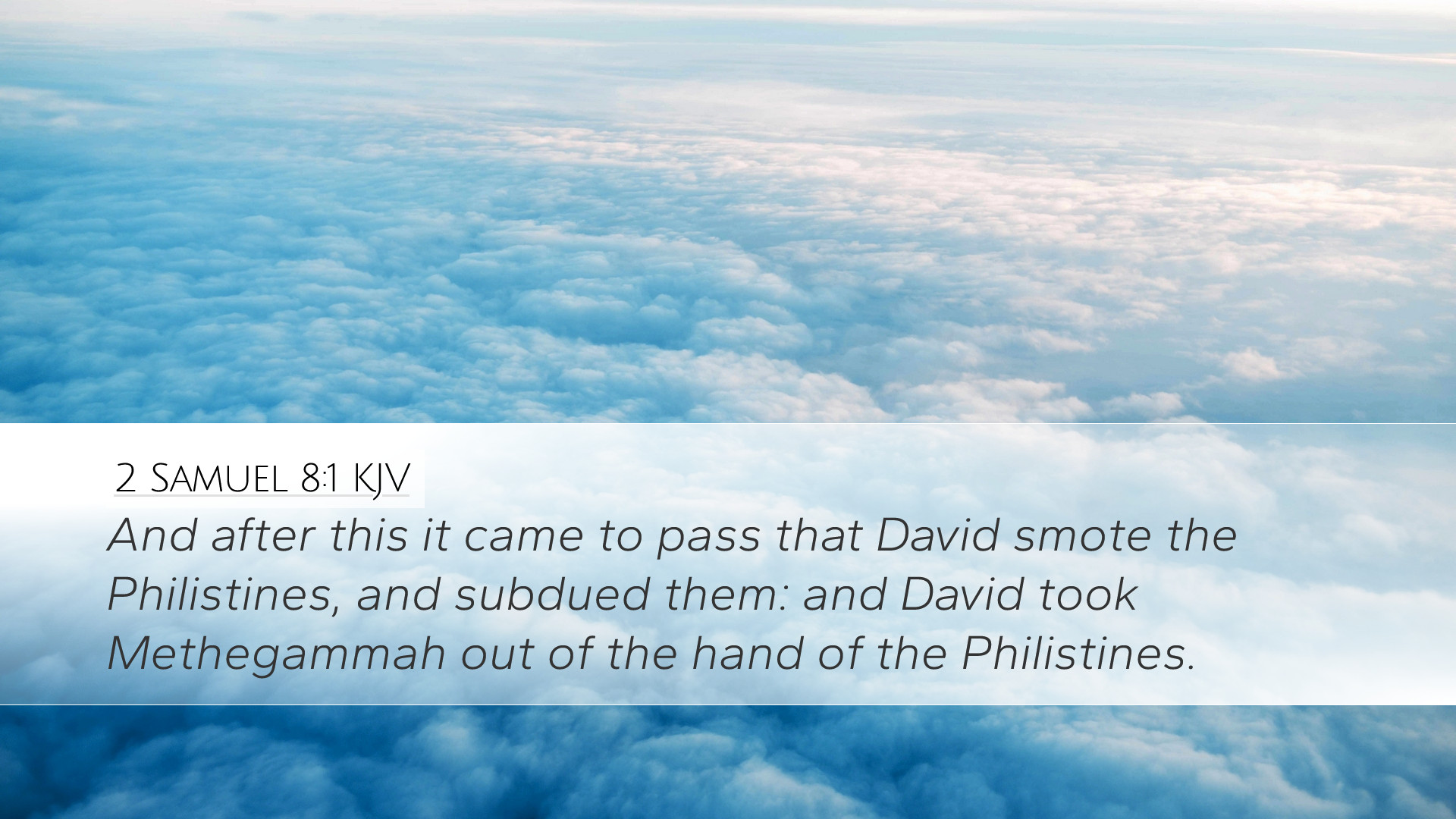Old Testament
Genesis Exodus Leviticus Numbers Deuteronomy Joshua Judges Ruth 1 Samuel 2 Samuel 1 Kings 2 Kings 1 Chronicles 2 Chronicles Ezra Nehemiah Esther Job Psalms Proverbs Ecclesiastes Song of Solomon Isaiah Jeremiah Lamentations Ezekiel Daniel Hosea Joel Amos Obadiah Jonah Micah Nahum Habakkuk Zephaniah Haggai Zechariah Malachi2 Samuel 8:1
2 Samuel 8:1 KJV
And after this it came to pass that David smote the Philistines, and subdued them: and David took Methegammah out of the hand of the Philistines.
2 Samuel 8:1 Bible Commentary
Bible Commentary on 2 Samuel 8:1
Verse: 2 Samuel 8:1 - "And after this it came to pass, that David smote the Philistines, and subdued them: and David took Metheg-ammah out of the hand of the Philistines."
Introduction
This verse marks a significant moment in the reign of King David, showcasing his military prowess and the establishment of Israel's dominance over neighboring nations. It captures both the geopolitical strategy of David and the theological implications of his victories, indicating divine support for his kingship.
Historical Context
The verse occurs in the period following David's consolidation of power after a tumultuous rise to the throne, characterized by war and intrigue. The Philistines had been perennial adversaries of Israel, and their defeat thus symbolized a critical turning point in the expansion of David’s rule.
Commentary Insights
-
Military Conquest:
According to Matthew Henry's Commentary, David's military campaigns were not merely a display of his might, but a fulfillment of the promise of land to the Israelites. Henry emphasizes that such victories were orchestrated as part of God's providential plans for Israel, positioning David as an instrument of divine justice.
-
Spiritual Significance:
Albert Barnes' Commentary highlights the theological dimension of David's victories, viewing them as manifestations of God's covenant with Israel. Barnes points out that every conquest by David was a direct link to the spiritual dominance intended by God for His chosen people, reinforcing their identity and purpose as a nation.
-
Geopolitical Understanding:
Adam Clarke's Commentary provides insight into the socio-political landscape of the time, specifically addressing the importance of the city of Metheg-ammah. Clarke explains that the acquisition of this stronghold from the Philistines was strategic in securing northern borders and showcasing Israel's military capabilities to surrounding nations.
David's Leadership
The verse serves as a testament to David's leadership qualities, marked by decisiveness and strategic planning. Henry articulates that David’s actions were not simply personal but depicted the responsibilities of a king to protect and expand his kingdom. This underscores a model of kingly leadership that balances military might with divine purpose.
Divine Favor and Human Agency
It is also critical to note the interplay of divine favor and human agency. Barnes discusses how David’s reliance on God for strength and victory is reflected throughout his conquests. This serves as a reminder for current leaders to seek divine counsel in all undertakings, recognizing that without God, their efforts will be in vain.
Applications for Today
For modern pastors, students, and scholars, this verse presents numerous applications:
-
Faith in Adversity:
Believers are encouraged to trust in God's guidance in their personal and communal struggles. Like David, one should remain steadfast in faith amidst challenges.
-
The Importance of Preparation:
David's strategic approach reminds us to prepare diligently for the tasks God sets before us, working earnestly while trusting in Him for the outcomes.
-
Understanding Leadership:
Leaders must understand that their responsibilities extend beyond personal gain—to the well-being of those they lead, reflecting the servanthood that Christ exemplifies.
Conclusion
In summary, 2 Samuel 8:1 encapsulates profound themes of divine sovereignty, human responsibility, and the complexities of leadership. The multi-faceted commentaries provide rich insights that are invaluable for pastoral teaching, academic study, and personal application.


